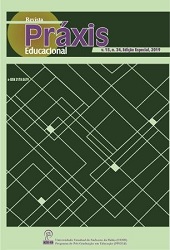DETERMINATION OF STUDENTS' VIEWS ON THE DEVELOPMENT OF TEACHING MATERIAL FROM WASTES
DOI:
https://doi.org/10.22481/praxisedu.v15i34.5795Palavras-chave:
Projeto de material instrucional, Resíduos, Conscientização ambiental, SustentabilidadeResumo
O objetivo deste estudo é determinar as opiniões de estudantes de educação especial sobre o processo de desenvolvimento de materiais didáticos utilizando resíduos. Esta pesquisa foi realizada com 82 alunos no último ano do curso de graduação do departamento particular de ensino eletrônico. Neste estudo, foram utilizadas como ferramentas de coleta de dados questões de entrevista semiestruturada, compostas por 5 questões. Nesta pesquisa, os alunos desenvolveram materiais para serem usados em atividades de ensino de conceitos no livro didático de conceitos. A pesquisa continuou por 12 semanas no semestre da primavera do ano acadêmico 2018-2019. No final do estudo, observou-se que os professores de pré-serviço usavam garrafas pet como o material usado mais desperdício no processo de desenvolvimento de materiais instrucionais a partir de materiais usados, e formas e texturas eram os assuntos que eles preferiam desenvolver. Com relação à necessidade de desperdício de materiais em termos de profissão docente, os alunos afirmaram que sua conscientização sobre a reciclagem aumentou ao final do processo. Em termos de ganhos no processo, os alunos afirmaram que aprenderam a trabalhar em condições difíceis no final do processo. Como o problema mais comum encontrado no processo de desenvolvimento de materiais com resíduos, os alunos afirmam que os resíduos coletados estão em uma condição muito higiênica.
Downloads
Metrics
Downloads
Publicado
Como Citar
Edição
Seção
Licença
Você é livre para:
Compartilhar - copia e redistribui o material em qualquer meio ou formato; Adapte - remixe, transforme e construa a partir do material para qualquer propósito, mesmo comercialmente. Esta licença é aceitável para Obras Culturais Livres. O licenciante não pode revogar essas liberdades, desde que você siga os termos da licença.
Sob os seguintes termos:
Atribuição - você deve dar o crédito apropriado, fornecer um link para a licença e indicar se alguma alteração foi feita. Você pode fazer isso de qualquer maneira razoável, mas não de uma forma que sugira que você ou seu uso seja aprovado pelo licenciante.
Não há restrições adicionais - Você não pode aplicar termos legais ou medidas tecnológicas que restrinjam legalmente outros para fazer qualquer uso permitido pela licença.










